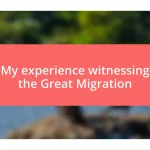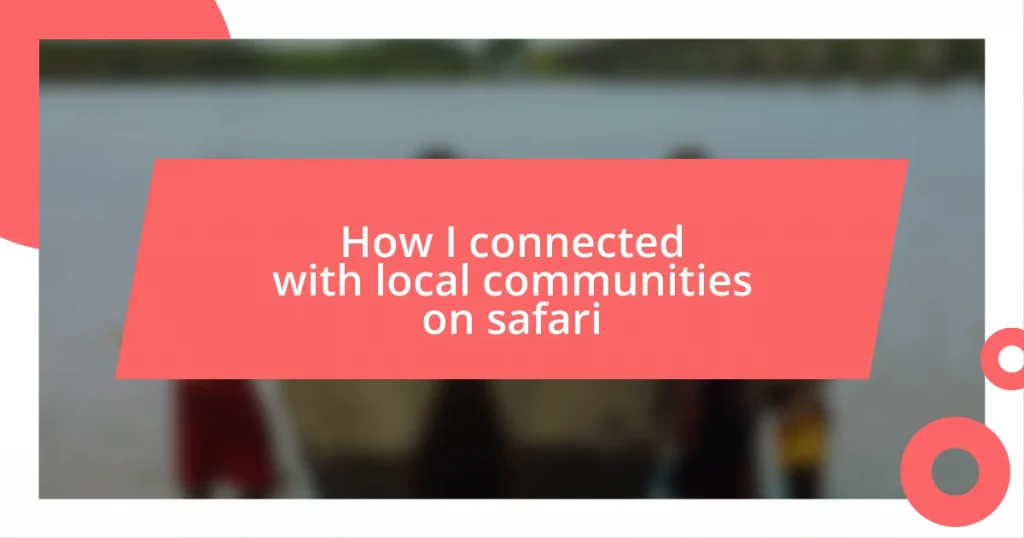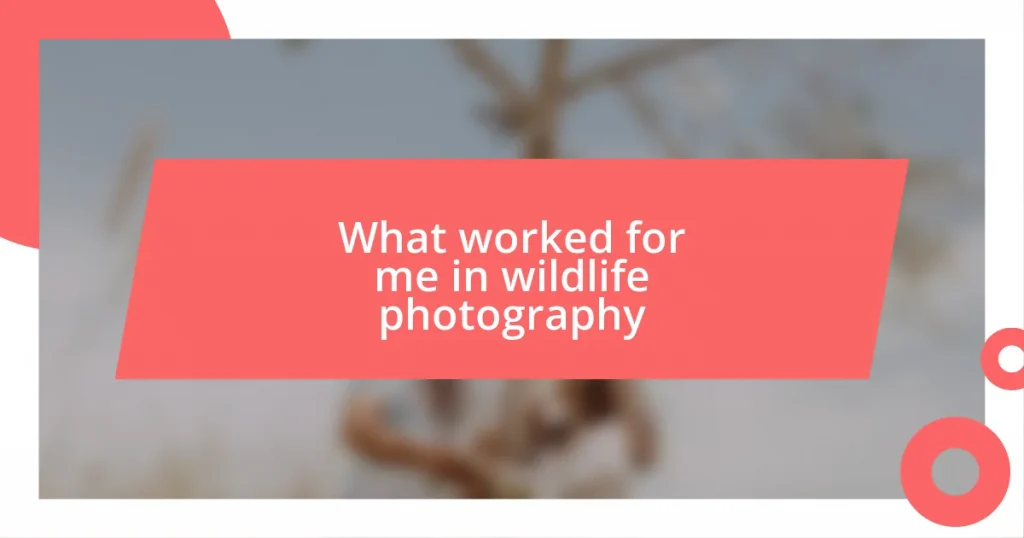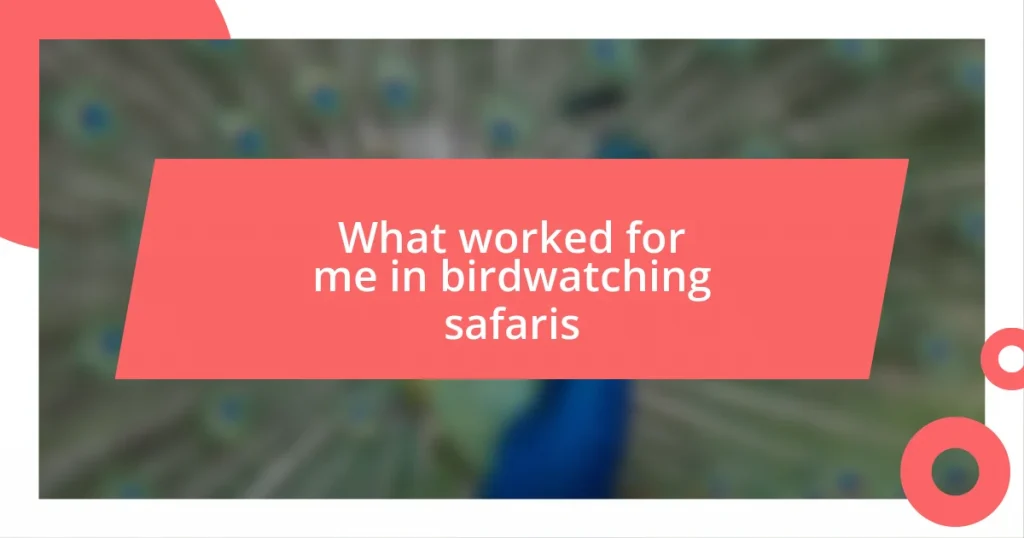Key takeaways:
- Engagement with local communities during safaris fosters cultural appreciation and understanding, highlighting the balance between tradition and modernization.
- Participating in community initiatives, such as conservation projects and literacy programs, allows visitors to contribute meaningfully while learning from locals.
- Cultural exchanges and shared experiences, like cooking and crafting, create lasting bonds and mutual respect between visitors and community members.
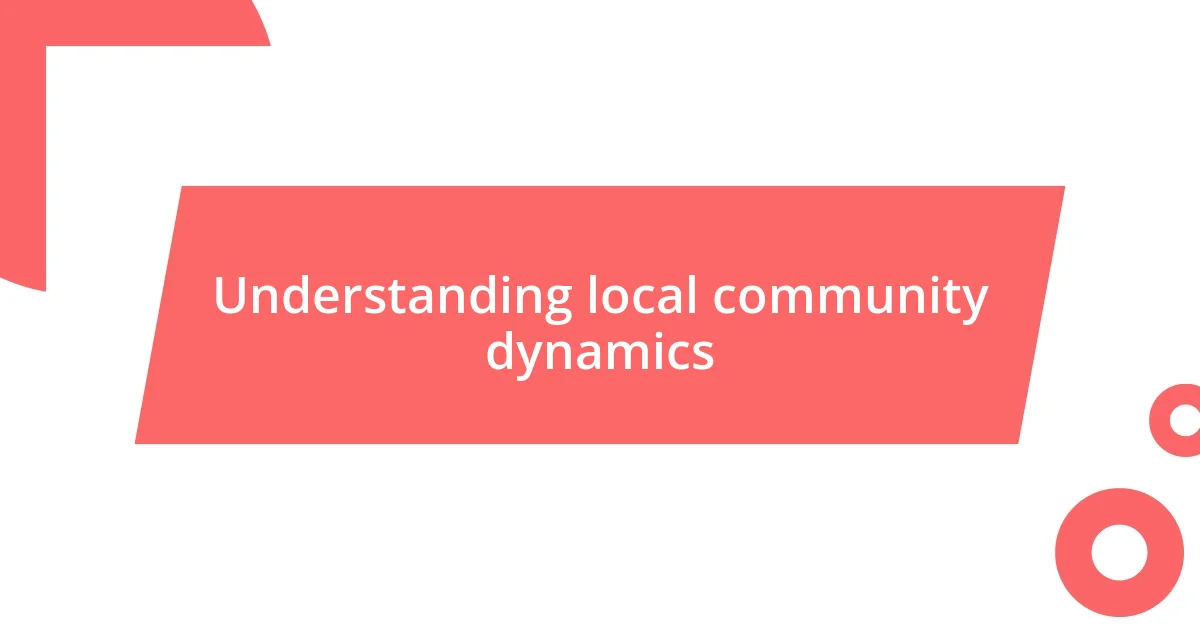
Understanding local community dynamics
Understanding the dynamics of local communities while on safari can be incredibly eye-opening. I remember one afternoon chatting with a guide who spoke passionately about how his village had integrated eco-tourism. It made me wonder: how often do we consider the intricate balance between maintaining cultural heritage and embracing modern economic opportunities? The stories he shared illustrated that these communities thrive on shared knowledge and mutual respect, creating a vibrant tapestry of relationships.
What struck me most was witnessing the diverse roles people play within their communities. For example, one woman I met wasn’t just a craftswoman; she was a historian, passing down ancestral stories through her art. Her work, rich with symbols and meanings, sparked a deep appreciation in me for how culture and identity can evolve while still holding on to roots. Have you ever realized that by simply engaging with someone, you might be uncovering layers of their life that contribute to a larger story?
I frequently ponder how our presence in these spaces can influence local dynamics. While observing a group of villagers collaborating on conservation efforts, I felt an overwhelming sense of hope. Here, people were united in purpose, demonstrating that the health of their environment is tied to their survival. It prompted me to ask myself: how can we, as visitors, ensure that our interactions uplift rather than disrupt? Understanding these dynamics means recognizing our role within them and striving to connect in ways that empower the community.
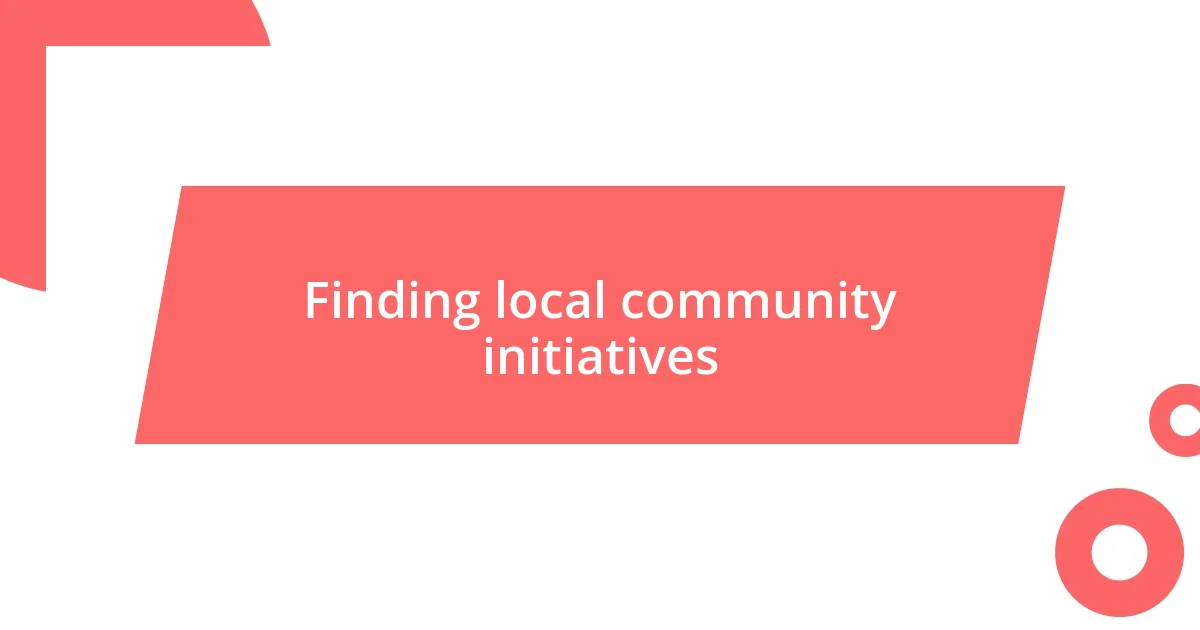
Finding local community initiatives
Finding local community initiatives often starts with curiosity and a willingness to engage. During one of my safaris, I ventured into a small village, fueled by a desire to learn about their sustainable practices. As I approached, I was greeted by villagers working on community gardens, and I felt a wave of warmth and solidarity. It’s amazing how small acts, like participating in these local projects, can cultivate a deeper bond between visitors and residents.
Networking with locals can reveal incredible community-led initiatives. I’ll never forget meeting a group that organized a literacy program, aimed at empowering women through education. Their passion was palpable, and it reminded me that every initiative, no matter how grand or humble, can spark change. Have you ever encountered efforts like these that left you inspired? The energy from their dedication was contagious, making me want to support and amplify their voices.
The beauty in finding such initiatives lies in the stories behind them. I recall a woman sharing how her handwoven baskets represented more than just craftsmanship; they told stories of her lineage and cultural teachings. These conversations allowed me to appreciate that community initiatives are often rooted in tradition while addressing current challenges. How often do we pause to really listen to these narratives that shape and define local identities? It’s through these connections that we truly understand the essence of the communities we visit.
| Initiative Type | Description |
|---|---|
| Sustainable Practices | Community gardens aimed at promoting healthy living and environmental awareness. |
| Literacy Programs | Empowering women through education to foster growth and self-sufficiency. |
| Craftsmanship | Artisans sharing cultural stories through their work, preserving tradition while teaching others. |
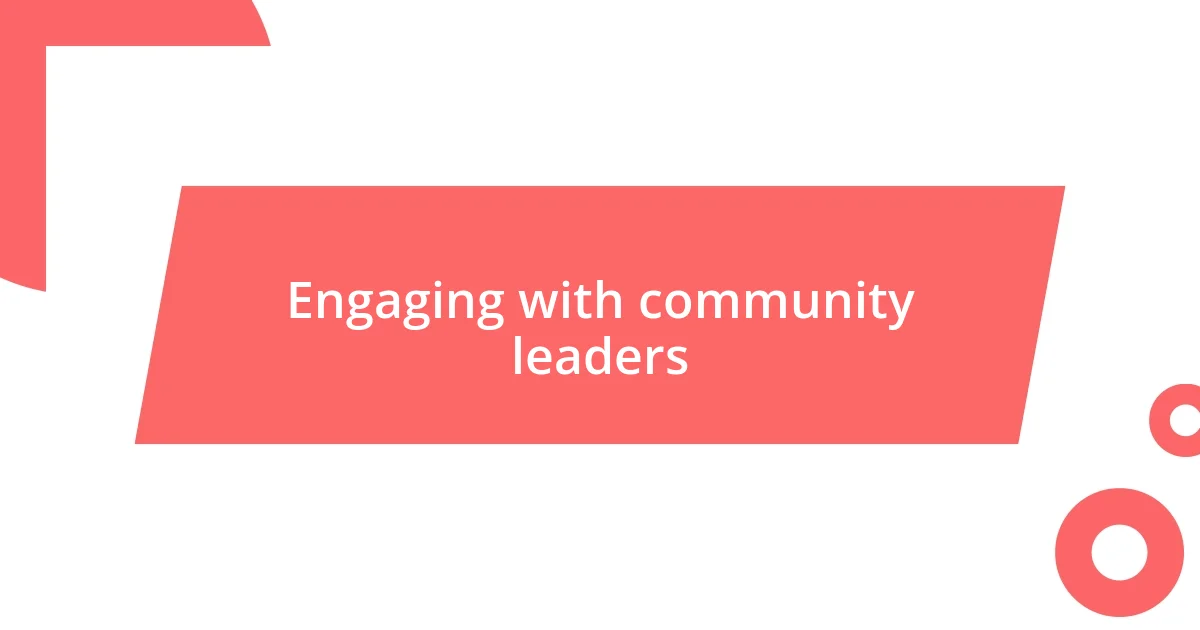
Engaging with community leaders
Engaging with community leaders has been one of the most enriching aspects of my safari experiences. I remember one memorable evening sitting with the village chief, a man whose deep lines of wisdom showed decades of experience. He shared how local traditions were not just practices but lifelines to the community, preserving their identity amid the pressures of modernization. Listening to him felt like opening a treasure chest of stories that reflected resilience, struggles, and dreams.
When I had the opportunity to speak with local leaders, I found it crucial to approach conversations with respect and genuine curiosity. Their insights can illuminate the profound connections between community values and tourism. Here’s a brief overview of key takeaways from these interactions:
- Cultural Preservation: Community leaders often emphasize the need for balancing modern influence with traditional practices.
- Economic Empowerment: They frequently discuss how tourism can create jobs but also stress the importance of sharing benefits equitably.
- Collaborative Projects: I was inspired by leaders who initiated partnerships with visitors to support local schools and health programs, fostering a sense of unity.
- Conflict Resolution: Hearing how they navigate challenges within and outside their communities opened my eyes to the importance of communication and adaptability.
Each conversation reinforced my belief that true engagement is about listening just as much as it is about sharing. Such moments remind me that by forging these connections, we not only learn but also become allies in the ongoing story of these vibrant communities.
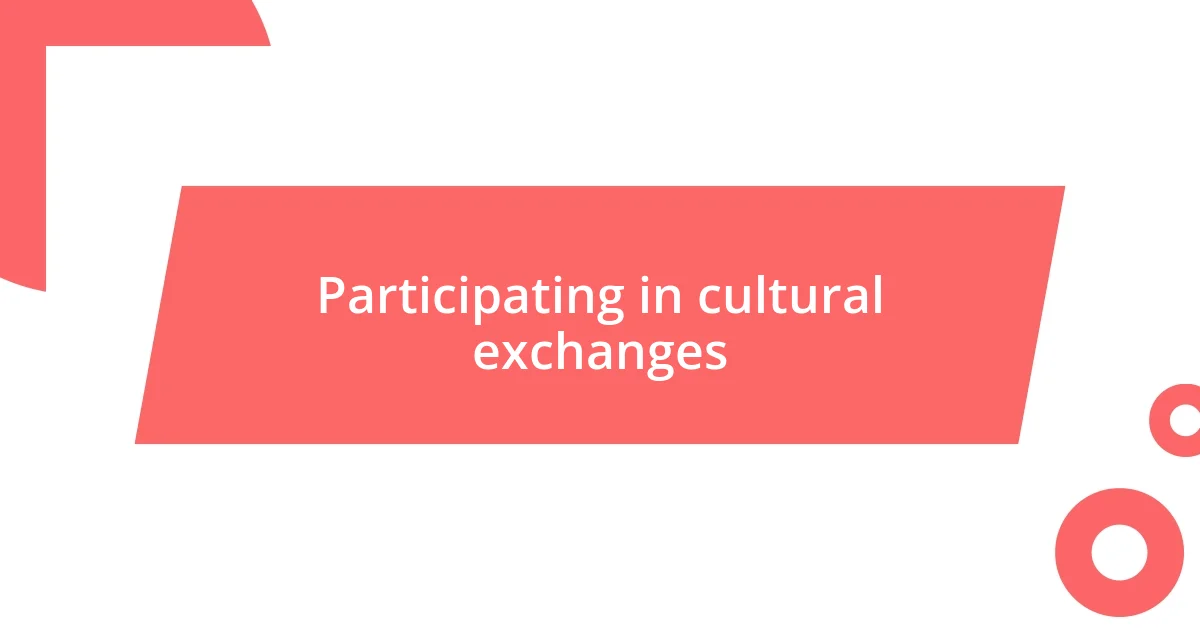
Participating in cultural exchanges
Participating in cultural exchanges opened my eyes to the beauty of shared experiences. During one particular village gathering, I was invited to join the locals in a traditional dance. As I clumsily followed their rhythm, laughter erupted around me, and for a moment, the barriers of language and background dissolved. It made me realize how movement can be a universal language—binding us in joy and connection.
One poignant experience occurred when I co-created a mural alongside local artists. Each stroke of paint became a conversation about our different worlds, yet our shared love for creativity. It struck me that cultural exchanges aren’t just about learning practices; they’re about collaborative storytelling. Have you ever found yourself painting a picture of understanding with someone from a different culture? By pouring our heart into that mural, we illuminated our individual cultures while forging a new, collective identity.
I also had the chance to exchange cooking techniques with a local chef, revealing the spice of both our traditions. As we crafted a hearty stew, we chatted about family recipes passed down through generations. The tenderness in her voice when recalling her grandmother’s lessons was palpable. It got me thinking: how often do we let food become a vessel for cultural wisdom? These exchanges are a reminder that through sharing our traditions, we not only celebrate diversity but also create lasting friendships that transcend borders.
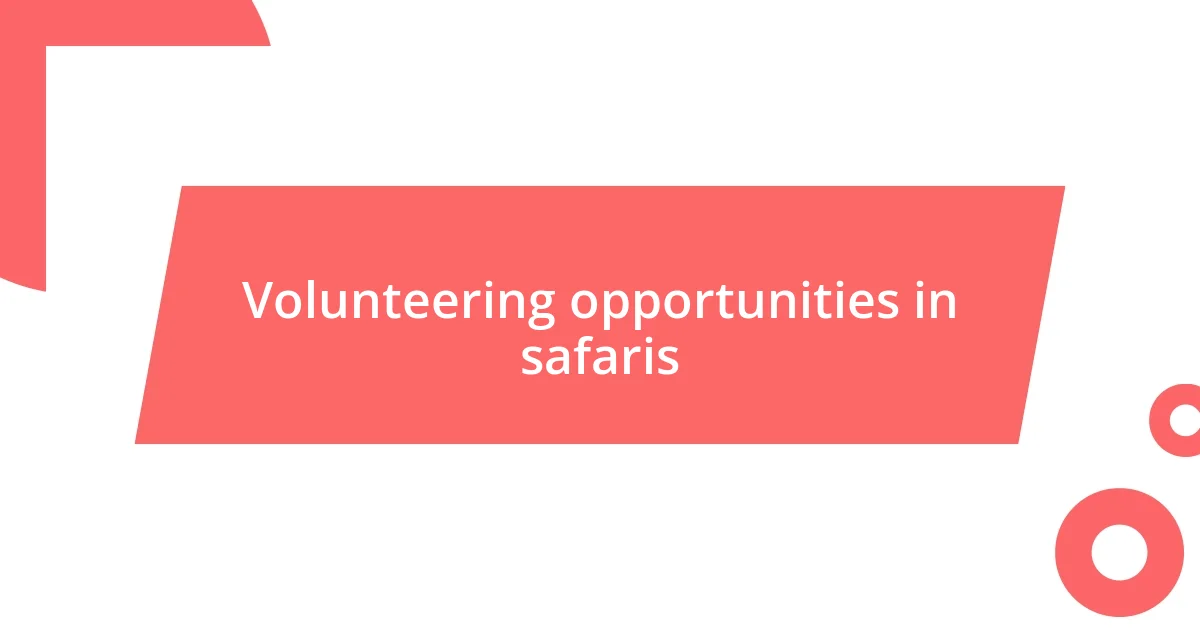
Volunteering opportunities in safaris
Volunteering opportunities during safaris can truly be life-changing. I recall a moment when I joined a conservation project aimed at protecting endangered wildlife. Working alongside dedicated locals, I learned how every small effort counts. We dug holes for new trees, and I felt a deep sense of connection to the land and its future. How many times have we felt that our contributions, no matter how tiny, can make a significant difference?
One of my most impactful experiences was volunteering at a local school. Helping to build classrooms, I could see the hope in the children’s eyes, eager for knowledge and a better future. I remember chatting with them during breaks, their laughter echoing in my heart. It was a reminder of the joy that comes from shared aspirations and dreams. Have you ever felt that rush of happiness when working toward a common goal? It makes you realize that while we come from different backgrounds, our dreams can unite us.
I also had the chance to participate in a community health initiative focused on educating locals about sustainable farming practices. I was struck by how willing people were to adapt and learn new methods to improve their yields. I shared my own farming experiences, and we exchanged ideas with enthusiasm. Isn’t it amazing how knowledge flows in both directions? Every interaction deepened my appreciation for the resilience of these communities, affirming that the true essence of volunteering lies not just in giving but also in learning from one another.
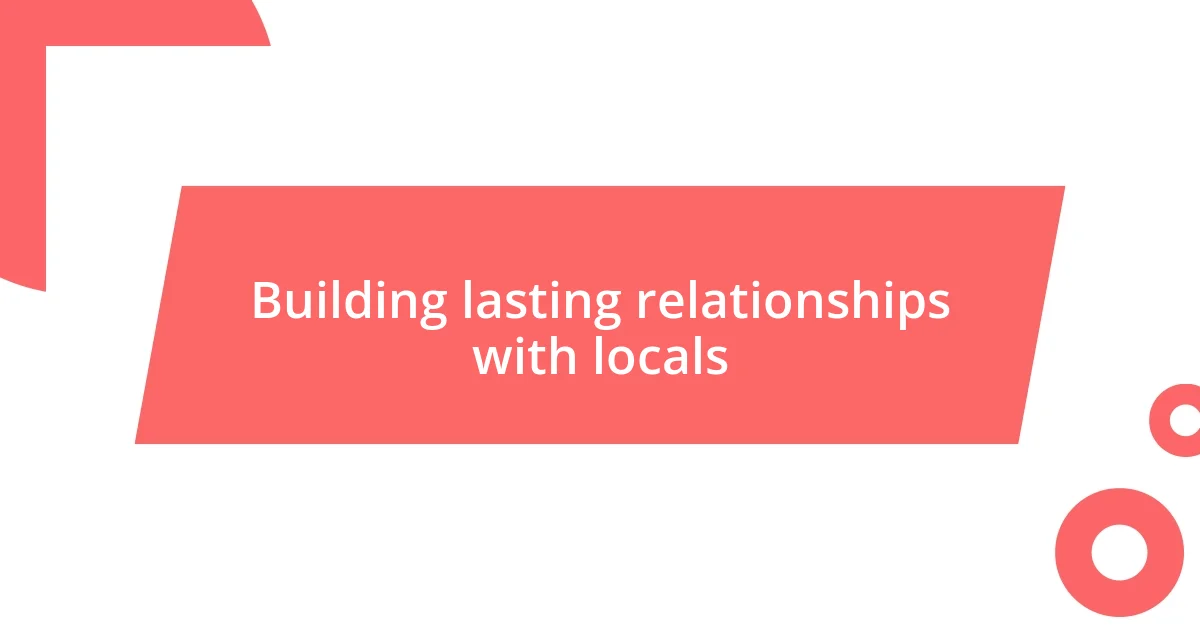
Building lasting relationships with locals
Building lasting relationships with locals involves more than just casual greetings; it’s about immersing yourself in their everyday lives. I remember one village where I spent evenings sharing stories around a fire with families. Their warmth and openness made me feel like part of their community. Have you ever sat in a circle of laughter, realizing that time and distance seemed irrelevant in that moment of shared connection?
During my travels, I was fortunate enough to attend a few local festivals. Each time, I was welcomed like family, sharing meals that contrasted my own palate, yet filled me with a profound sense of belonging. There was a particularly vibrant celebration where the community’s love for music and dance enveloped me. Isn’t it incredible how music can unite diverse cultures in harmony? This experience made me reflect on how such moments can foster friendships that stand the test of time, strengthened by shared memories and experiences.
One particularly memorable bond I formed was with a local artisan who taught me his craft. Every afternoon spent shaping clay felt like sculpting not just the pottery, but also our friendship. I learned about his dreams and struggles as he shared his passion for preserving traditional techniques. It struck me how building relationships often requires vulnerability and openness. Have you ever gained a friend by simply sharing your passions? In that cozy workshop, I discovered that while our backgrounds differed, our mutual respect and admiration for one another became the foundation of a lasting connection.
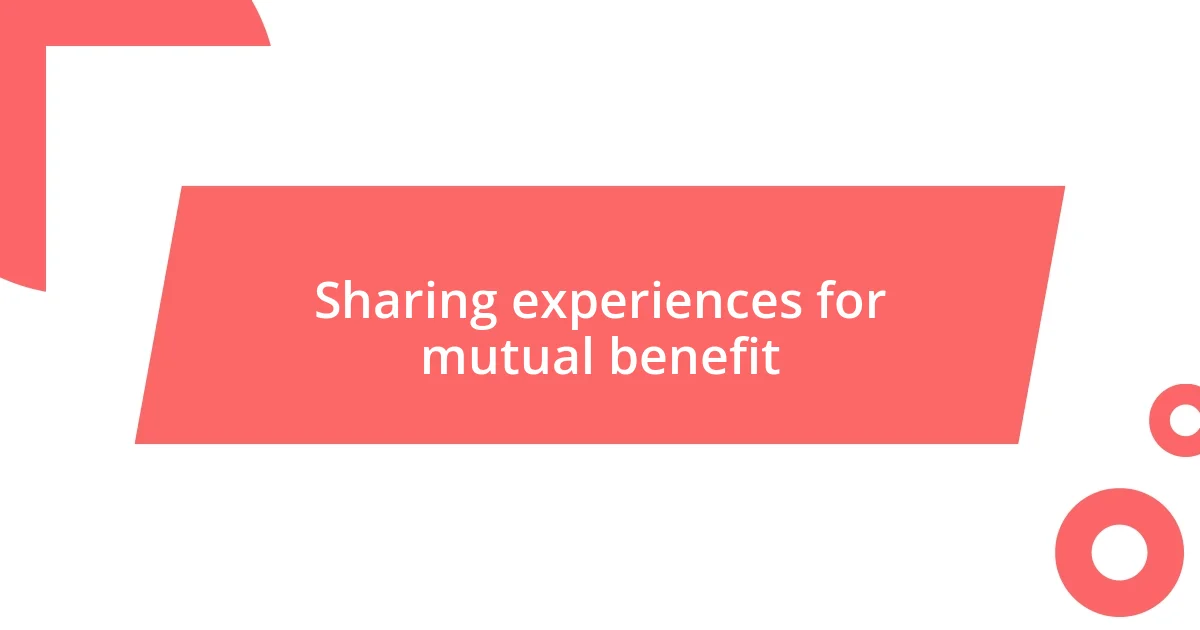
Sharing experiences for mutual benefit
Sharing experiences can create a beautiful cycle of mutual benefit. I recall a time during my safari when a local guide shared stories about his ancestors’ ways of living in harmony with nature. As he spoke, I began relating these traditions to my own experiences with nature conservation back home. This exchange was enlightening; it didn’t just help me understand their culture but also reinforced what I believed about stewardship. Isn’t it fascinating how our experiences, although different, can resonate with each other in profound ways?
Once, while visiting a community workshop, I participated in a bead-making session. As we crafted jewelry, the locals shared their techniques and the stories behind each design. In return, I shared insights about sustainable fashion, a topic close to my heart. This dialogue was more than just a skill exchange; it was a fusion of creativity and purpose, connecting us through shared interests and passions. Have you ever found joy in teaching someone while learning from them at the same time? It’s moments like these that remind me of the richness that comes from collaboration.
There was a day when I joined a group of women in the village for cooking. As we prepared a traditional dish, laughter filled the air, and we learned about each other’s culinary secrets. I brought a recipe from my culture and soon, we were blending flavors from all over the world. This experience brought us closer, highlighting the beauty of our differences and the wealth of knowledge we all carry. Wouldn’t you agree that sharing our traditions can bridge gaps and cultivate friendships? Those meals became more than just food; they were celebrations of our interconnected lives, creating a lasting bond.








